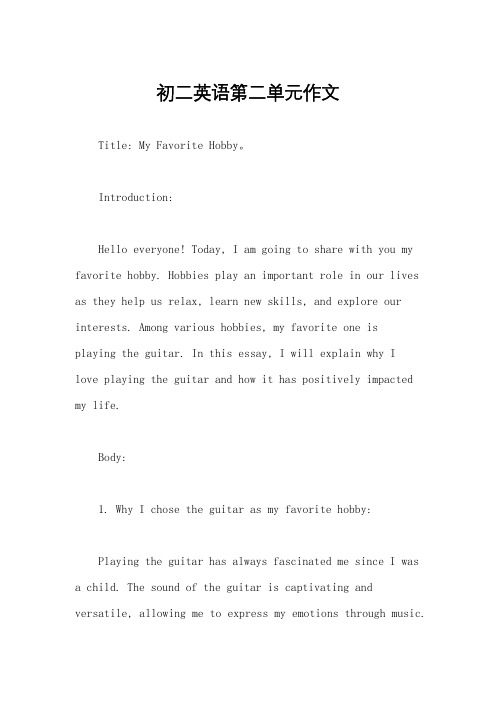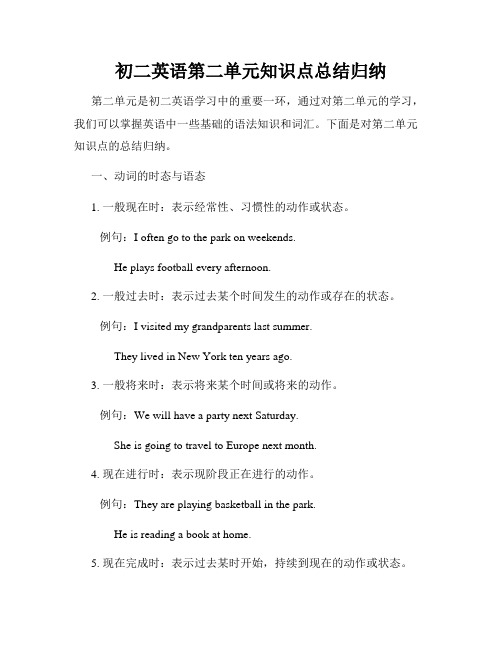初二英语2(
初二上册英语unit2单词

初二上册英语unit2单词Unit 2 How often do you exercise?一、重点单词。
1. housework ['haʊswɜːk] n. 家务劳动;家务事。
2. hardly ['hɑːdli] adv. 几乎不;几乎没有。
3. ever ['evə(r)] adv. 在任何时候;从来;曾经。
4. once [wʌns] adv. 一次;曾经。
5. twice [twaɪs] adv. 两次;两倍。
6. Internet ['ɪntənet] n. (国际)互联网;因特网。
7. program ['prəʊɡræm] n. (= programme)节目。
8. full [fʊl] adj. 忙的;满的;充满的。
9. swing [swɪŋ] n. 摆动;秋千v. (使)摆动;摇摆。
10. maybe ['meɪbi] adv. 大概;或许;可能。
11. least [liːst] adv. 最小;最少adj. & pron. 最小的;最少的。
12. junk [dʒʌŋk] n. 无用的东西;无价值的东西。
13. coffee ['kɒfi] n. 咖啡。
14. health [helθ] n. 健康;人的身体(或精神)状态。
15. result [rɪ'zʌlt] n. 结果;后果。
16. percent [pə'sent] n. (= per cent)百分之……17. online [ˌɒn'laɪn] adj. & adv. 在线(的);联网(的)18. television ['telɪvɪʒn] n. 电视节目;电视机。
19. although [ɔːl'ðəʊ] conj. 虽然;尽管;即使。
20. through [θruː] prep. 以;凭借;穿过。
初二英语第二单元作文

初二英语第二单元作文Title: My Favorite Hobby。
Introduction:Hello everyone! Today, I am going to share with you my favorite hobby. Hobbies play an important role in our lives as they help us relax, learn new skills, and explore our interests. Among various hobbies, my favorite one isplaying the guitar. In this essay, I will explain why Ilove playing the guitar and how it has positively impacted my life.Body:1. Why I chose the guitar as my favorite hobby:Playing the guitar has always fascinated me since I was a child. The sound of the guitar is captivating and versatile, allowing me to express my emotions through music.Additionally, I admire guitarists who can skillfully play different genres of music, which motivates me to improve my own skills.2. The benefits of playing the guitar:Playing the guitar has numerous benefits, both mentally and physically. Firstly, it helps me relax and reduce stress. Whenever I feel overwhelmed or tired, strumming the strings of my guitar instantly calms me down and allows me to escape from the pressures of daily life. Moreover, playing the guitar improves my focus and concentration. It requires me to read sheet music, remember chords, and coordinate my fingers, all of which enhance my cognitive abilities.3. How playing the guitar has positively impacted my life:Playing the guitar has had a significant impact on my life in several ways. Firstly, it has improved my self-confidence. Performing in front of an audience, whetherit's my family or friends, has boosted my self-esteem and helped me overcome stage fright. Secondly, playing theguitar has also broadened my social circle. I have met many fellow guitar enthusiasts through music classes and online communities, allowing me to form new friendships and share my passion with others.4. My journey of learning the guitar:Learning to play the guitar has been a challenging yet rewarding journey. I started by taking basic guitar lessons, where I learned the fundamental techniques and chords. As I progressed, I began exploring different music styles and experimenting with my own compositions. I also enjoy watching online tutorials and attending workshops tofurther enhance my skills. Although there have been moments of frustration and setbacks, the joy of playing the guitar always keeps me motivated to continue improving.Conclusion:In conclusion, playing the guitar is my favorite hobbydue to its captivating sound, numerous benefits, and positive impact on my life. It has helped me relax, improve my focus, boost my self-confidence, and expand my social circle. Learning to play the guitar has been an exciting journey, and I look forward to further exploring this wonderful instrument. If you haven't already, I encourage you to find a hobby that brings you joy and fulfillment, just like playing the guitar does for me.。
人教版英语初二下册 Unit 2 I`ll help to clean up the city park 知识讲解

Unit 2 I’ll help to clean up the city parks.词句精讲精练词汇精讲1. clean upclean up意为“打扫”,up为副词,此短语是动副型短语,如果宾语为代词,应放在短语中间;如果宾语是名词,可放于短语之间或两词之后。
例如:Please clean up this street at once. 请马上把这条街打扫干净。
This street is dirty. Please clean it up. 这条街道太脏了,请把它打扫干净。
2. cheer upcheer up意为“变得高兴,振奋起来”,是“动词+副词”结构的短语。
cheer up既可作及物动词短语,也可作不及物动词短语。
例如:He cheered up at once when I agreed to help him. 我同意帮助他时,他马上高兴起来。
Cheer up! The news isn’t too bad. 振作起来!这消息不是太坏。
He took her to the cinema to cheer her up. 为了让她高兴,他带她去了电影院。
【拓展】(1) cheer作不及物动词,意为“欢呼;喝彩”。
例如:The girls cheered as the famous singer arrived. 当这位著名的歌手到达时,女孩子们大声欢呼。
(2) cheer作及物动词,意为“为……欢呼,高呼”。
例如:The whole village turned out to cheer the hero. 全村人都出来向那位英雄欢呼。
(3) cheer作可数名词,意为“欢呼声;喝彩声”。
例如:We can hear the cheers of students outside the gym. 我们在体育场外就能听到学生的欢呼声。
(4) cheer on意为“为……加油”。
例如:We will have a basketball game this afternoon. Would you like to come and cheer us on?我们今天下午有一场篮球比赛,你愿意来为我们加油吗?3. give outgive out意为“散发;分发”,相当于hand out,是“动词+ 副词”结构的短语动词。
unit2《schoollife》知识讲解(牛津英语初二上)doc初中英语

unit2《schoollife》知识讲解(牛津英语初二上)doc初中英语学习内容一、Language points 重点难点讲二、综合技能和发音课文讲解一、Language points 重点难点讲1.Daniel wants to learn more about the subjects that British students study.丹尼尔想了解更多有关英国学生所学的课程的情形。
句中的study为及物动词,它的宾语是引导定语从句的关系代词that.▲study作及物动词或不及物动词,意为〝学习〞〝研究〞。
如:①All of then study hard.他们大伙儿都努力学习。
②They are studying the beginning of life.他们正研究生命的起源。
▲study 也可作名词,意为〝研究〞〝学习〞〝书房〞。
如:①They are making a study of UFO.他们正在对不明飞行物进行研究。
②How are you getting on with your studies ?你的学习情形如何?▲learn 作〝学习〞解时,一样指学习、学会较简单的东西,后接动词不定式作宾语。
作〝明白〞解时,可接从句作宾语。
Learn of /about 意为〝了解〞〝听讲〞。
如:①They are learning some new words. 他们在学一些新单词。
②We are learning to drive/how to drive. 我们在学开车。
听到他逝世的消息我们专门难过。
[注]在表示〝学习科目〞的两词可换用。
如:①He learns /studies English. 他学英语。
2.John wrote back and attached some pictures to his e-mail.约翰回复了并把一些照片粘贴到了电子邮件上。
attach 作及物或不及物动词,意为〝附上〞〝加上〞〝贴上〞,常与介词to连用。
初二英语2单元句子

听写(unit2)1. 怀特一家没有足够的时间给我们写信,只好给我们打了个电话。
2.她很抱歉没有把比赛的票给我们。
3. 他付不起饭钱,只好向妈妈求助。
4. 我发现我们很难很早入睡。
能告诉我们该怎么办?5.他有时找我们借点钱,但从未忘记尽快还给我们。
6. 直到与同学相处好了才停止与同学打架。
7. 除他外,人人都在抱怨穿过时衣服。
8. 现在是把我们同那个好学生比比的时候了。
难道我们不比他好得多吗?9. 很快的吃了晚饭后,他们必须回到书房开始工作。
10. 在一方面,我们需要尽量多学。
在另一方面,我们需要参加大量的课后有组织的活动。
11. 当他还是一个很小的小孩时,就被送去一个人住到学校了。
12. 我们感到我们必须要学会如何为自己设计自己的生活。
13. 尽管你还没有到穿那条裙子的年龄,但那裙子适合你(穿)14. 在那条大河的每一边都有一条很繁华的马路。
*15. 我回家既可以赶车,也可步行。
Answers:1.怀特一家没有足够的时间给我们写信,只好给我们打了个电话。
The Whites didn’t have enough time to write a letter to us. They had to give us a call.The Whites were too busy (not free enough) to write to us.2.她很抱歉没有把比赛的票给我们。
She felt sorry that she failed to give us the tickets to the match.3. 他付不起饭钱,只好向妈妈求助。
He couldn’t pay for (couldn’t afford) the dinner and had to ask his mother for help.4. 我发现我们很难很早入睡。
能告诉我们该怎么办?I found it hard for us to fall asleep(go to sleep) early. Can you tell us what to do(What we should/can do?5.他有时找我们借点钱,但从未忘记尽快还给我们。
八年级英语第二单元笔记

八年级英语第二单元笔记English: In the second unit of eighth-grade English, we learned about a variety of topics including family, friends, and relationships. We discussed different types of families, such as nuclear families and extended families, as well as the roles and responsibilities within a family. We also learned about the importance of communication and conflict resolution within families and among friends. Additionally, we talked about the qualities of a good friend and the importance of building and maintaining positive relationships. Throughout the unit, we practiced speaking, listening, reading, and writing to improve our language skills and deepen our understanding of the topics.中文翻译:在八年级英语的第二单元中,我们学习了关于家庭、朋友和人际关系等多种主题。
我们讨论了不同类型的家庭,如核心家庭和大家庭,以及家庭内的角色和责任。
我们还学习了家庭和朋友之间沟通和冲突解决的重要性。
此外,我们也谈论了一个好朋友的品质以及建立和维护积极关系的重要性。
初二英语第二单元知识点总结归纳

初二英语第二单元知识点总结归纳第二单元是初二英语学习中的重要一环,通过对第二单元的学习,我们可以掌握英语中一些基础的语法知识和词汇。
下面是对第二单元知识点的总结归纳。
一、动词的时态与语态1. 一般现在时:表示经常性、习惯性的动作或状态。
例句:I often go to the park on weekends.He plays football every afternoon.2. 一般过去时:表示过去某个时间发生的动作或存在的状态。
例句:I visited my grandparents last summer.They lived in New York ten years ago.3. 一般将来时:表示将来某个时间或将来的动作。
例句:We will have a party next Saturday.She is going to travel to Europe next month.4. 现在进行时:表示现阶段正在进行的动作。
例句:They are playing basketball in the park.He is reading a book at home.5. 现在完成时:表示过去某时开始,持续到现在的动作或状态。
例句:I have learned English for three years.She has written five letters this week.6. 一般被动语态:表示动作的接受者比较重要,而不注重动作的执行者。
例句:The book is read by many students.The cake was eaten by the children.二、形容词与副词的比较级与最高级1. 形容词的比较级:在两个人或事物之间进行比较时所使用的形式。
例句:He is taller than me.This book is more interesting than that one.2. 形容词的最高级:在三个或三个以上的人或事物之间进行比较时所使用的形式。
初二英语上册unit2单词

初二英语上册unit2单词人教版初二英语上册Unit 2单词。
一、housework ['haʊswɜːk] n. 家务劳动;家务事。
1. 例句:I often help my mother with the housework.(我经常帮我妈妈做家务。
)二、hardly ['hɑːdli] adv. 几乎不;几乎没有。
1. 用法:hardly为否定副词,位于实义动词之前,be动词、助动词、情态动词之后。
2. 例句:I can hardly understand what he said.(我几乎听不懂他说的话。
)三、ever ['evə(r)] adv. 在任何时候;从来;曾经。
1. 例句:Have you ever been to Beijing?(你曾经去过北京吗?)四、hardly ever几乎从不。
1. 例句:He hardly ever watches TV.(他几乎从不看电视。
)五、once [wʌns] adv. 一次;曾经。
1. 用法:可用于一般过去时,表示过去的某个时间“一次”或者“曾经”。
2. 例句:I went to Paris once.(我去过巴黎一次。
)六、twice [twaɪs] adv. 两次;两倍。
1. 例句:I have been to this city twice.(我去过这个城市两次。
)七、Internet ['ɪntənet] n. (国际)互联网;因特网。
1. 例句:We can get a lot of information on the Internet.(我们能在互联网上得到很多信息。
)八、program ['prəʊɡræm] n. (= programme)节目。
1. 例句:My favorite TV program is the news.(我最喜欢的电视节目是新闻。
)九、full [fʊl] adj. 忙的;满的;充满的。
- 1、下载文档前请自行甄别文档内容的完整性,平台不提供额外的编辑、内容补充、找答案等附加服务。
- 2、"仅部分预览"的文档,不可在线预览部分如存在完整性等问题,可反馈申请退款(可完整预览的文档不适用该条件!)。
- 3、如文档侵犯您的权益,请联系客服反馈,我们会尽快为您处理(人工客服工作时间:9:00-18:30)。
初二英语复习(一)一、重点词、句辨别1、buy、spend、pay、cost和takebuy、spend、pay、cost和take都有“花费”的意思。
区别在于:buy sb sth=buy sth for sb给某人买某物,是这五个单词中唯一一个可以跟双宾语的spend:sb spend some time/money on sth 某人花多少钱买某物/花多少时间多某事sb spend some time (in)doing sth 某人花多少时间在某事上面,in可以省略pay:sb pay some money for sth 某人为某物付多少钱pay some money for sb 为某人付钱pay back 还钱pay off 还清cost:主语一定是物,sth cost sb some money 某物花了某人多少钱take:有一个固定句型:it take sb some time/money to do sth 做某事花了某人多少时间/多少钱2、sure的用法be sure that+句子be sure of sth.be sure to do sth.3、such和for example1) for example用来举例说明某一论点或情况,一般只举同类人或物中的"一个"为例,作插入语,可位于句首、句中或句末,后面应加逗号隔开。
I like ball games ,for example ,volleyball and basketball.我喜欢球类运动,比如棒球和篮球。
2) such as用来列举事物时,一般列举同类人或事物中的几个例子。
插在被列举的事物与前面的名词之间,as后面不可有逗号。
English is spoken in many countries, such as Australia and Canada. 许多国家都讲英语,例如澳大利亚和加拿大。
4、fall 与dropfall 与drop两者都可表示“掉”、“落”,区别如下:1). 表示从高处往下掉或降,两者有时可互换。
如:The temperature has dropped [fell]. 气温降低了。
He dropped [fell] from the top of the building. 他从屋顶掉了下来。
2). (1)fall 表示“落下”,多指无意识的行为,有自然坠落之意,且通常是不及物动词。
Rain began to drop [fall]. 开始下起雨来了。
(2)drop 既可指无意的行为,即表示“落下”(不及物),也可指有意的行为,即表示“投下”(及物)。
如Drop the hammar down to me. 把锤子扔下来给我。
He dropped the letter into the mail-box. 他把信投入信箱。
Medical supplies are being dropped to the stricken area. 目前正将医药用品空投到灾区。
二、重点语法讲解——状语从句修饰主句中的动词, 形容词和副词, 通常有从属连词引导, 按其意义和作用可分为时间, 地点, 条件, 原因, 让步, 目的, 结果, 方式, 比较.等1. 时间状语从句:1) 常见连词有after, as, before, once, since, till, (not)until, when, whenever(no matter when), while, as long as, as soon as etc.2) no sooner…than, hardly(scarcely, barely)…when: 刚做…就….3) 还有immediately, directly, instantly, the moment, the minute, the instant, the second, every time etc2. 地点状语从句: 一般用where or wherever 引导3. 条件状语从句:真实条件从句:if, unless, so long as, provided that, supposing that, on condition that, in the event that, in case that etc4. 原因状语从句: 从属连词有because, as ,since, for, now, that, in that, seeing that, considering that(鉴于,由于)5. 让步状语从句:1): even if, though, even though, while(尽管) no matter what/how/which, however, whatever, whichever, however etc.2) 由as 引起的让步从句, 语气较强烈,被强调的词须放在句首.3) whether…or,不管…或…6. 结果状语从句: so that, so…that, such…that7. 目的状语从句: so that, in order that, for fear that, lest, in case8. 方式状语从句: as, just as, as if: 如同…一样9. 比较状语从句:1) as…as, not so/as…as2) 比较级+than, so much/a lot more than3) no more…than, not more…than, less…than4) the more…the more附:no more than adv. 只是;仅仅Each class has no more than 8 students.每个班级的学生不超过8个。
Most molecules live for no more than weeks at a time.要知道大多数分子的寿命都不超过一星期。
The American Heart Association advises no more than 3 grams for healthy people.美国心脏协会建议,对健康人来说,每天食盐不应超过3克。
以上,都有"只不过/仅仅"强调很少的意思.not more than 就没有"很少"这种意思.只是客观上说,不多于...not more than不超过;至多;不比…更…And the earholes are not more than three.还有耳洞不能超过三个。
Answer these questions in not more than 75 words.回答以下问题,不要超过75个单词。
I have not more than three relatives in this city.在这个城里,我至多只有三个亲戚。
三、试题演练基础知识(共两部分,30小题,计30分)Ⅰ.词汇(共10个小题,每小题1分,计10分)A)圈出每组中不同类的那个词,并写在答题卷的相应位置。
(提示:判断是否同类的法则,先是看是否词性相同;若都是同词性词,则看它们所表示的范畴)21. unpleasant, impossible, impolite, improve22. discover, foreigner, winner, litter23. European, Asian, African, Russian24. huge, low, less, loud25. boring, amazing, spring, interestingB)释义:从下列选项中选出一个与划线部分意思相同或相近的答案。
26. What‟s wrong with your computer?A. What aboutB. What‟s troubleC. What‟s the matter27. I gave him a ring last Sunday, but he was out.A. phoned himB. rang up himC. shouted at him28. Mr Smith reached Beijing at 9:00 last night.A. gotB. arrived atC. came29. I saw him crossing the bridge.A. went acrossB. going throughC. going across30. If you miss so many lessons, you‟ll fail the exam.A. don‟t haveB. don‟t wantC. catchⅡ.单项填空(共20小题,每题1分,计20分)从A、B、C 三个选项中选出能填入空白处的最佳答案。
31. What ____ you ______ at this time yesterday?A. did; doB. are; doingC. were; doing32. She didn‟t go home. I didn‟t go home, _______.A. tooB. alsoC. either33. He asked me _____ a report card.A. writeB. writingC. to write34. The teacher said I could do better _____ English.A. inB. atC. for35. Thank you for ______ me with my homework.A. helpB. helpsC. helping36. ____ is easy for a child to wake up and know where they are.A. ItB. ThatC. This37. I‟m sure he will _____ pass the exam.A. canB. is able toC. be able to38. ____eye exercises ____ good _____ your eyes.A. Doing; are; forB. Do; is; forC. Doing; is; for39. The river is very dirty. ______ people want to swim in it.A. A fewB. LittleC. Few40. I‟ve been ________for five hours.A. skateB. skatingC. skated41. There are many trees on ______ side of the street.A. bothB. everyC. each42. The man _____ glasses is my physics teacher.A. withB. hasC. wears43. There is little milk in the bottle, ________?A. is itB. is thereC. isn‟t there44. How did you make him______?A. stop talkingB. to stop talkingC. stops talking45. Can you tell us ____?A. where does he liveB. where he livesC. where he does live46. — How do you usually come to school?—_____ my father‟s car.A. ByB. InC. With47. The teacher told the children that the earth ____ around the sun.A. movesB. movedC. was moving48. --- Which do you prefer, oranges or apples?---_______. I …d like bananas.A. Yes, bothB. Neither, thank youC. No, thanks49. Lin Tao is as ______ as Zhang Hua.A. strongB. strongerC. the strongest50. There are five ________ people in the city.A. millionsB. million ofC. million阅读(共两部分,20小题,计30分)Ⅰ.完形填空(共10小题,计10分)A)通读短文,从所给A、B、C三个选项中选出一个最佳选项完成短文。
